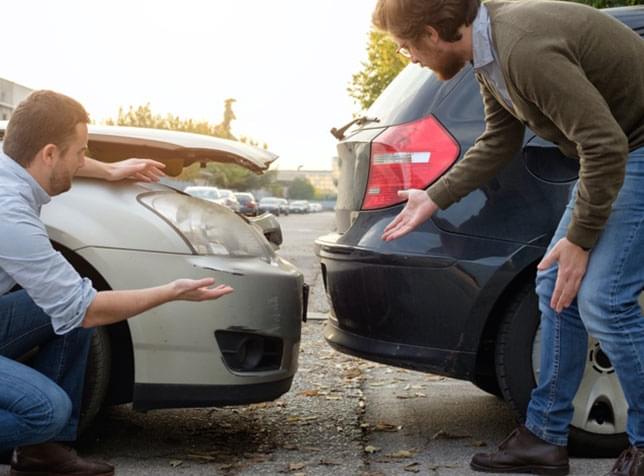Car Insurance Basics
Learn the basics of your car insurance policy so you can manage it with ease.

What Is Car Insurance?
An auto insurance policy is a contract between you and an insurance company - sometimes a local insurance company, sometimes nationwide. (It’s always a good idea to do an auto insurance quotes comparison – and we’re sure you’ll find that, in most cases, The General® is the lowest!)
In exchange for paying a premium, the car insurance company promises to pay for specific car-related financial losses within the selected coverage limits that you may have during the term of the agreement.
Basically, if you get in an accident, car insurance protects you from financial hardships that could result from damage, injuries, or lawsuits from other drivers.
Most states require that you carry automobile liability insurance in certain minimum amounts. If you are at fault in an accident, the law typically requires that you pay the damages sustained by the person who is not at fault. These can include property damage, which is the cost to repair or replace any property that you have damaged.

What Is a Deductible?
A deductible is the portion of the claim that the policyholder must pay before the insurance company pays. The higher the deductible, the lower the cost of the coverage. If you get into an accident, or your car is damaged, your insurance company will pay for the cost of the repairs that surpasses the deductible, up to your policy limits. If the cost of your repairs cost less than what your deductible is, you may save money paying for the repairs on your own.
What Is a Lien Holder?
The lien holder (or loss payee) is an entity that has a financial interest in the vehicle. In most cases this is the bank or lending institution that has financed the loan on the vehicle.
Types of Car Insurance Coverage
There are several types of car insurance. These include Liability Coverage, Medical Payments Coverage, Uninsured Motorist Coverage, and Coverage for Damage to Your Auto (Comprehensive and Collision, or Collision Insurance). Let’s go into detail on the different types of car insurance:
Ready to get started with an auto insurance policy from The General?
Get a Free Online Quote NowWhy You Need Car Insurance
If you plan on driving in any state you’ll need car insurance. Even drivers in the two states that don’t legally require it drive with car insurance, and that’s with good reason. Car insurance benefits you and other drivers on the road whom you might get into an accident with. It protects you from huge expenses related to damage or total loss of your car and other drivers’ cars after an accident. Car insurance can also protect the financial loss of your car if you’re in an accident with an uninsured or underinsured driver.
However, the benefits of car insurance aren’t limited to your car. If you, or someone else who’s involved in an accident with you, is injured, your car insurance may help you pay for medical expenses that your regular health insurance might not cover, like dental work and other medical care required after the accident.

If the state you live in requires some type of car insurance coverage, you’ll need to get the set amount of minimum coverage. Some auto finance companies require you to have comprehensive and collision coverage while you’re paying off your car loan as well.
For more information on what type of car insurance coverage exists and which ones you may need, talk to one of The General’s agents today, get an online quote in under 2 minutes, and learn all about different car insurance options.
Frequently Asked Questions
Your car insurance premium will vary based on several factors, which could include your driving record, credit history, vehicle, and family insurance exclusions. You can get a quote online or contact an agent at The General to figure out how to get affordable car insurance based on your needs.
Nearly all 50 states require you to drive with some level of car insurance. When shopping for insurance, check with your state for the minimum coverage you’re required to have. Next, explore additional options, such as underinsured motorist coverage and roadside assistance, to decide how much protection you would like to have on and off the road. You can learn more about The General’s auto insurance coverage options here.
Most of the time, when you buy a newer car through a finance company, your car’s value decreases as you drive it. However, if you’re ever in an accident where your new car is severely damaged or totaled, the amount an insurance company gives you might not cover the remaining balance of your auto loan. This is where gap insurance may help you. Gap insurance is offered through many finance companies and auto insurance companies. In an event where you owe more on your auto loan than what you receive for your totaled car, gap insurance will cover the difference. The General offers gap insurance in some states, and you can speak with one of our agents to learn more.
Collision insurance is defined as losses you incur when your automobile collides with another car or object. For example, if you hit a car in a parking lot, the damages to your car will be paid (up to your policy limits) under your collision coverage.
Comprehensive car insurance provides coverage for most other direct physical damage with things other than collisions. For example, damage to your car from a natural disaster, like a tornado, will be covered (up to your policy limits) under your comprehensive coverage. Other examples are vandalism, falling objects, fire, animals, and unless required by a finance or leasing company, comprehensive and collision insurance are usually optional. However, that certainly doesn’t mean they aren’t important. You wouldn’t want to be caught in a hailstorm and not have comprehensive insurance!
For more information on what collision insurance is, what comprehensive insurance is, and how much you might need, talk to one of our friendly agents today.
A “restricted” policy is an optional endorsement that restricts coverage under your policy to only those individuals who are specifically listed on your policy.







